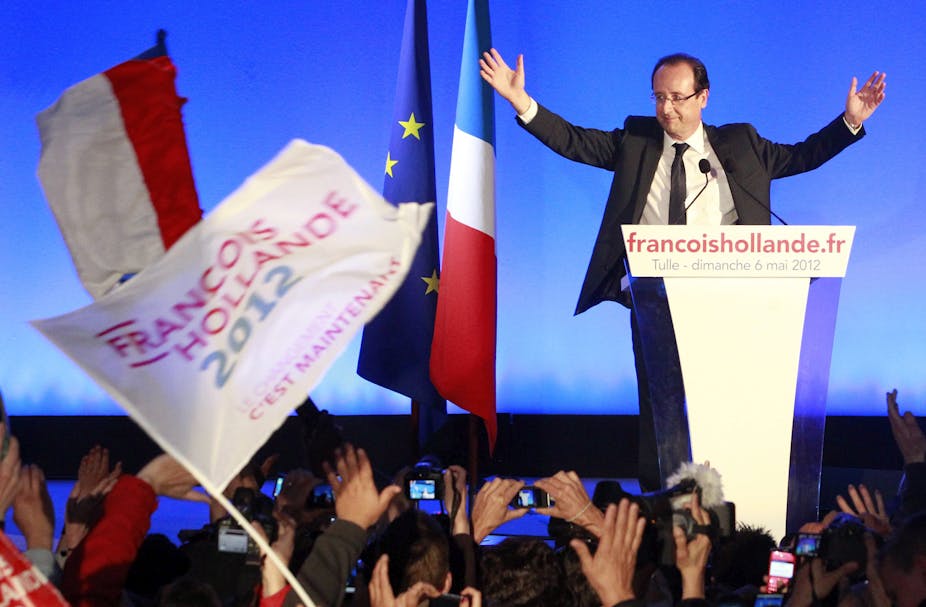Socialist candidate Francois Hollande has won the French presidential election with 52% of the vote, ousting sitting president Nicolas Sarkozy.
In hindsight, there have been few surprises in this campaign and election. Of course, many French people and commentators have been shocked or disappointed by the various twists and turns, but all that happened was predictable in a cold-headed analysis.
The rise of the right
The elections took place after five years of unabashed right-wing populism and the stigmatisation of parts of the population – a cheap cure for the fear and anxiety felt by many as economic and social insecurity increased.
In 2007, when Nicolas Sarkozy won the presidency, many celebrated the limiting of the extreme right vote to “just” 10%. But this had been the cost of Sarkozy borrowing much of the right’s rhetoric, and making it mainstream. If the far-right Front National (FN) receded then, it was not because its ideas had been defeated, but because they had been taken up in a large part by the centre.

The FN’s apparent fall was sure to prove short-lived. While Sarkozy kept a strong, almost authoritarian, rhetoric throughout his presidency, his moderate credentials prevented him from implementing radical right policies. He thus failed to truly assuage those on the right who had turned to him. As the 2012 elections loomed, it seemed obvious that many voters would leave the copy and return to the original.
This was amplified by Marine Le Pen’s successful leadership takeover from the party her father, Jean-Marie le Pen, founded. Here again, it would be wrong to assume that she revolutionised the party and that the line she toed made her radically different from the previous versions of the FN. Her programme and strategy were in line with 20 years of slow mainstreaming and legitimisation of the party and its discourse. After her father’s “defeat” in 2007, when asked if it was the end of her party, Marine Le Pen declared that to the contrary: “it was the victory of its ideas”. 2012 proved she was right.
This time around, she polled at more than 18% in the first round and outbid the FN’s previous record by more than two million votes. More importantly for Le Pen, the Front National was no longer a pariah in French politics. It was the third contender and unlikely to go away any time soon. Its ethno-exclusivist programme now appealed to almost a fifth of the voters, and to a growing electorate who admitted proudly their support of the party and its reactionary and neo-racist politics.
Stuck in the middle
For Nicolas Sarkozy and his team, who had planned to run a first-round campaign to their right to quash Le Pen, before moving to the centre between the two rounds, the results was a watershed. The second part of his campaign could no longer be moderate as he was obliged to appeal to his right flank, which weighed almost twice as much as the centre electorate.

In what seemed a desperate attempt, he went further in his stigmatisation of minorities and encouraged the most extreme forms of nationalism, by emphasising for example the necessity for stronger border security. Centre candidate François Bayrou felt Sarkozy had gone too far and called for his supporters to vote for Socialist candidate François Hollande.
Many voices rose to denounce Sarkozy’s race to the bottom. Within the ranks of his party, in another attempt to appeal to everyone, some called for alliances to be made with the FN for the upcoming parliamentary elections, while others refused any deal.
Sarkozy said the Front National’s values were “republican”. For the first time since World War Two, a president had accepted the extreme right as a normal, “democratic” contender. It was not the FN which had changed, it was the way it was viewed. It was the result of 20 years of mainstreaming and five years of Sarkozism.
This mainstreaming of the extreme right discourse was further demonstrated between the two rounds. Both candidates, to different degrees, attempted to appeal to the 18% who had turned to a neo-racist alternative.
Sarkozy clearly painted the foreigner as a threat, while Hollande refused to fight the president on ethical grounds and joined in the attack against illegal immigration. Border security became a massive issue, despite polls showing it was not the main concern of the French population.
A poisoned chalice?
While the first polls predicted a large victory for Hollande, the final results were much narrower than expected, with Hollande winning with only 51.7% of the vote.
The socialist president will now be facing a very uncomfortable term. While a larger victory could have allowed him to break away from right-wing populist politics and concentrate on a positive, progressive agenda with a strong support within the population, the polls reminded him that Sarkozy’s legacy was still strong.
Despite the now former president’s extremely low approval ratings at the end of his presidency, more than 48% of voters still felt he remained the better alternative. Hollande will therefore have to keep in mind this part of the population composed in part of a growing fringe of paranoid disillusioned members ready to go ever deeper into extreme right politics.
Hollande will also have to contend with the resurgent extreme left, which polled 11% in the first round and played a crucial part in his election.
Finally, he will have to either stand strong against his European colleagues and impose his alternative to austerity against the will of his German partners, or bend to their will and lose the low margin of credit he was given last night.
In all cases, the future of France and Europe is uncertain.

